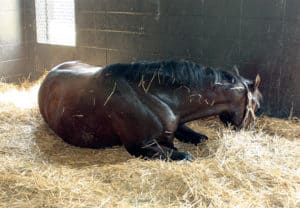Latest News – The Horse
Betsy Cohen on Proper Leather Care: Horse Tip Daily #129
Betsy Cohen has worked for over 10 years with Bickmore. Betsy joins us to share her knowledge on leather care and horse care. Today she
Less Than 500 Survey Responses Needed to Reach 10,000!
Please help the American Horse Publications–a group of nearly every equine-related magazine, newsletter, breed organization, Web site, and horse publishing entity–reach the 10,000-mark with the
Surely Awesome Part 3: Surgery
On Monday in this new excerpt from the book Equine ER, Surely Awesome came to Rood & Riddle Equine Hospital in Kentucky with a shattered

Challenges of EPM Diagnosis (AAEP 2009)
Dr. Amy Johnson of the University of Pennsylvania New Bolton talks about the challenges of diagnosing EPM. (2:59)

Preparing for Colic (AAEP 2009)
Dr. Anthony Blikslager of the North Carolina State University talks about colic in horses. (7:39)
Mare Aborts Full Sister to Barbaro
One day after Barbaro’s brother Lentenor broke his maiden in impressive fashion, farm managers reported that La Ville Rouge, the dam of both horses, aborted her 2010 foal.
The foal, which was aborted Dec. 24, 2009, had been sired by Dynaformer and would have been a full sibling to the 2006 Kentucky Derby winner, as well as the first filly produced from La Ville Rouge.
Horse Vets Say: Hold the Persimmons, Please (AAEP 2009)
Persimmons are tropical, bright orange fruits that are claimed to have many health benefits in humans, from helping prevent cancer to arresting the hiccups. However, they have a dark side–they can form hard “concretions,” or fiber masses, in the gastrointestinal tracts of horses and humans that can require surgery to remove.
Such masses, termed bezoars, are even harder
Freeze Stops European Atypical Myopathy Reports
The largest outbreak of equine atypical myopathy in Europe has ended with freezing winter temperatures, with a record number of 371 reported cases, according to a group of researchers in Belgium.
Atypical myopathy causes severe generalized weakness and stiffness, often ending in death. Urine becomes coffee-colored, and blood workups show significant increases i
Great Britain EIA: 50 Horses Exposed
Fifty horses were exposed to equine infectious anemia (EIA) at a stable in Swindon, Wiltshire, England. All horses on the infected premises appeared clinically normal but will be tested at 30-day intervals for up to 90 days. The two positive mares, which were recently imported from Romania, were euthanized.
This information was included in a Jan. 20 report submitted to the
Send Horse Reproduction, Lameness, Skin Questions to AAEP
Veterinarians will provide horse owners with timely, accurate information on reproduction, lameness, and equine skin conditions through the American Association of Equine Practitioners’ online “Ask the Vet” discussion tool. Horse owners are invited to pose questions to AAEP-member veterinarians regarding each month’s specific veterinary topic. Upcoming topics and participat
ASPCA Awards Nearly $550,000 in Equine Grants in 2009
The American Society for the Prevention of Cruelty to Animals (ASPCA) awarded $546,789 in the form of 164 equine grants to rescue groups and humane organizations across the country in 2009, according to its just-released year-end report.
Grants were distributed in 40 states and the District of Columbia.
A major factor in dealing with large-scale cruelty seizures involve
Barbaro Brother Lentenor Breaks Maiden
Lentenor, a full brother to ill-fated 2006 Kentucky Derby winner Barbaro, broke his maiden impressively on the turf Jan. 20 at Gulfstream Park.
Making his third start and first as a 3-year-old, Lentenor went off as the even-money favorite in the 1 1/16-mile maiden special weight contest. The son of Dynaformer and La Ville Rouge, by Carson City, stayed close to the pace set by long
Versailles’ Famed Horse Farms
Versailles (Kentucky, that is) is located just outside Lexington and is another bluegrass horse farm hotspot. Its scenic country roads, quaint community charm, and resident
Boyd Martin on Vetting a Horse for Sale: Horse Tip Daily #128
Boyd Martin is an international eventer who makes his home and competes for the United States. Boyd is a very colorful, well liked guy in
Mobile Vet Clinic to Aid Haiti Animal Relief Efforts
The Animal Relief Coalition for Haiti (ARCH) will be able to utilize a mobile veterinary clinic from by the Antigua and Barbuda Humane Society. The United Animal Nations recently provided an update on ARCH progress.
A field team based in the Dominican Republic will drive the clinic across the border into Haiti once authorities grant permission. Field responders will use the clinic
EIA: British Horse Owners Advised Not to Panic
The British Horse Society is urging horse owners not to panic after two horses in Wiltshire, England, tested positive for equine infectious anemia (EIA), also called “swamp fever.”
Equine infectious anemia is an untreatable disease of horses, donkeys, and mules, spread by the exchange of bodily fluids, including via insect vectors. Affected horses remain infectious carr









